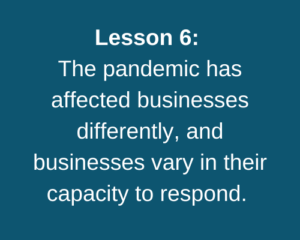Lessons Learned from Ecosystem Building in Oregon: Lesson 6

“We learned that many businesses in La Grande/Union County do not have access to computers, printers or scanners. This made it difficult to process grant and loan documents electronically and led to the use of paper documents submitted through the City of La Grande water payment drop box.”
– Lisa Dawson, Executive Director of NEOEDD
2020 was a terrible year for businesses and entrepreneurs, and all of the organizations that are featured in this learning document experienced high levels of stress supporting businesses in their local economies. Due to the hard work of these organizations, many entrepreneurs were able to receive the support they needed to remain in business. Of the 176 businesses that we surveyed after receiving support from these local service providers, 33% said that their business was sustained due to this direct assistance. A large portion of that number is likely a result of local organizations helping business owners access emergency grant funds.
Despite these successes, businesses and the organizations that serve them faced obstacles that tested their resilience. Community support organizations faced technological hurdles: last spring, they quickly had to adapt their programs from in-person to online platforms. While this had some positive impacts on the cost of programming and allowed them to reach larger, more geographically diverse audiences, they struggled to reach many business owners who are less technologically literate. Additionally, entrepreneurs living in rural areas with poor broadband connection had challenges accessing services.
Smaller and newer businesses in general had more difficulty in accessing support, because they were less networked into the community, less knowledgeable about support services, and had less bandwidth and staff capacity to dedicate to accessing emergency funds. Conversations with business owners and entrepreneurs in Florence, OR found that businesses that were sole proprietorships, had little business experience, and/or were not well connected to the rest of the business community had the hardest times accessing PPP Loans and other support programs. Additionally, retail businesses and restaurants were particularly strained throughout the pandemic, as they struggled to keep up with the changing safety regulations.
